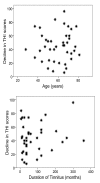Simplified form of tinnitus retraining therapy in adults: a retrospective study
- PMID: 18980672
- PMCID: PMC2605434
- DOI: 10.1186/1472-6815-8-7
Simplified form of tinnitus retraining therapy in adults: a retrospective study
Abstract
Background: Since the first description of tinnitus retraining therapy (TRT), clinicians have modified and customised the method of TRT in order to suit their practice and their patients. A simplified form of TRT is used at Ealing Primary Care Trust Audiology Department. Simplified TRT is different from TRT in the type and (shorter) duration of the counseling but is similar to TRT in the application of sound therapy except for patients exhibiting tinnitus with no hearing loss and no decreased sound tolerance (wearable sound generators were not mandatory or recommended here, whereas they are for TRT). The main goal of this retrospective study was to assess the efficacy of simplified TRT.
Methods: Data were collected from a series of 42 consecutive patients who underwent simplified TRT for a period of 3 to 23 months. Perceived tinnitus handicap was measured by the Tinnitus Handicap Inventory (THI) and perceived tinnitus loudness, annoyance and the effect of tinnitus on life were assessed through the Visual Analog Scale (VAS).
Results: The mean THI and VAS scores were significantly decreased after 3 to 23 months of treatment. The mean decline of the THI score was 45 (SD = 22) and the difference between pre- and post-treatment scores was statistically significant. The mean decline of the VAS scores was 1.6 (SD = 2.1) for tinnitus loudness, 3.6 (SD = 2.6) for annoyance, and 3.9 (SD = 2.3) for effect on life. The differences between pre- and post-treatment VAS scores were statistically significant for tinnitus loudness, annoyance, and effect on life. The decline of THI scores was not significantly correlated with age and duration of tinnitus.
Conclusion: The results suggest that benefit may be obtained from a substantially simplified form of TRT.
Figures

References
Grants and funding
LinkOut - more resources
Full Text Sources

